The Role of Community Support Programs in Recovery
June 17, 2025
Building Strength Through Community Support in Addiction Recovery

Understanding the Power of Community in Overcoming Addiction
Recovery from substance use disorder is a complex journey that benefits significantly from community involvement. Support programs, peer networks, and community resources provide essential emotional, social, and practical assistance, fostering resilience and long-term sobriety. This article explores how community support initiatives influence recovery outcomes, the mechanisms behind their effectiveness, and the different types of programs available.
The Multifaceted Benefits of Community and Support Groups
What are the benefits of community and support groups in recovery from substance use disorder?
Community and support groups provide essential benefits that significantly aid individuals recovering from substance use disorder. These groups serve as safe environments where members can openly share their personal experiences, emotions, and coping strategies. This sharing fosters a sense of understanding and reduces feelings of loneliness and shame that are common in recovery journeys.
Support groups also help individuals develop and refine practical coping skills, which are crucial for managing triggers and cravings. Through peer support and shared stories, members gain hope and motivation, recognizing that long-term sobriety is achievable. The emotional backing from others who understand their struggles fills gaps that healthcare professionals alone might not fully address.
Accessibility and flexibility are additional advantages of support groups, which can be organized in various formats— in-person, online, or via phone— making participation easier for diverse populations. While there are some risks such as misinformation or privacy concerns, proper moderation and the careful selection of trustworthy groups enhance their positive impact, encouraging sustained recovery and personal growth.
Role of support groups in recovery
Support groups play a crucial role in long-term addiction management by fostering community bonds, providing continuous encouragement, and reinforcing recovery skills. They serve as ongoing resources where individuals can seek advice, share setbacks, and celebrate progress, strengthening their resilience over time.
Providing emotional and practical support
Beyond emotional comfort, these groups often facilitate practical support like guidance on navigating treatment options, access to community resources, and assistance with daily challenges. They empower members to rebuild social connections, which are vital for a stable recovery foundation.
Impact on long-term sobriety
Participation in community and support groups increases the likelihood of maintaining sobriety over the long term. Evidence suggests that regular engagement can boost motivation, provide accountability, and create a network of lasting relationships that support ongoing abstinence. While relapse can occur, support groups help individuals view setbacks as part of the recovery process, encouraging persistence and resilience on the journey to recovery.
Peer Support as a Catalyst for Recovery
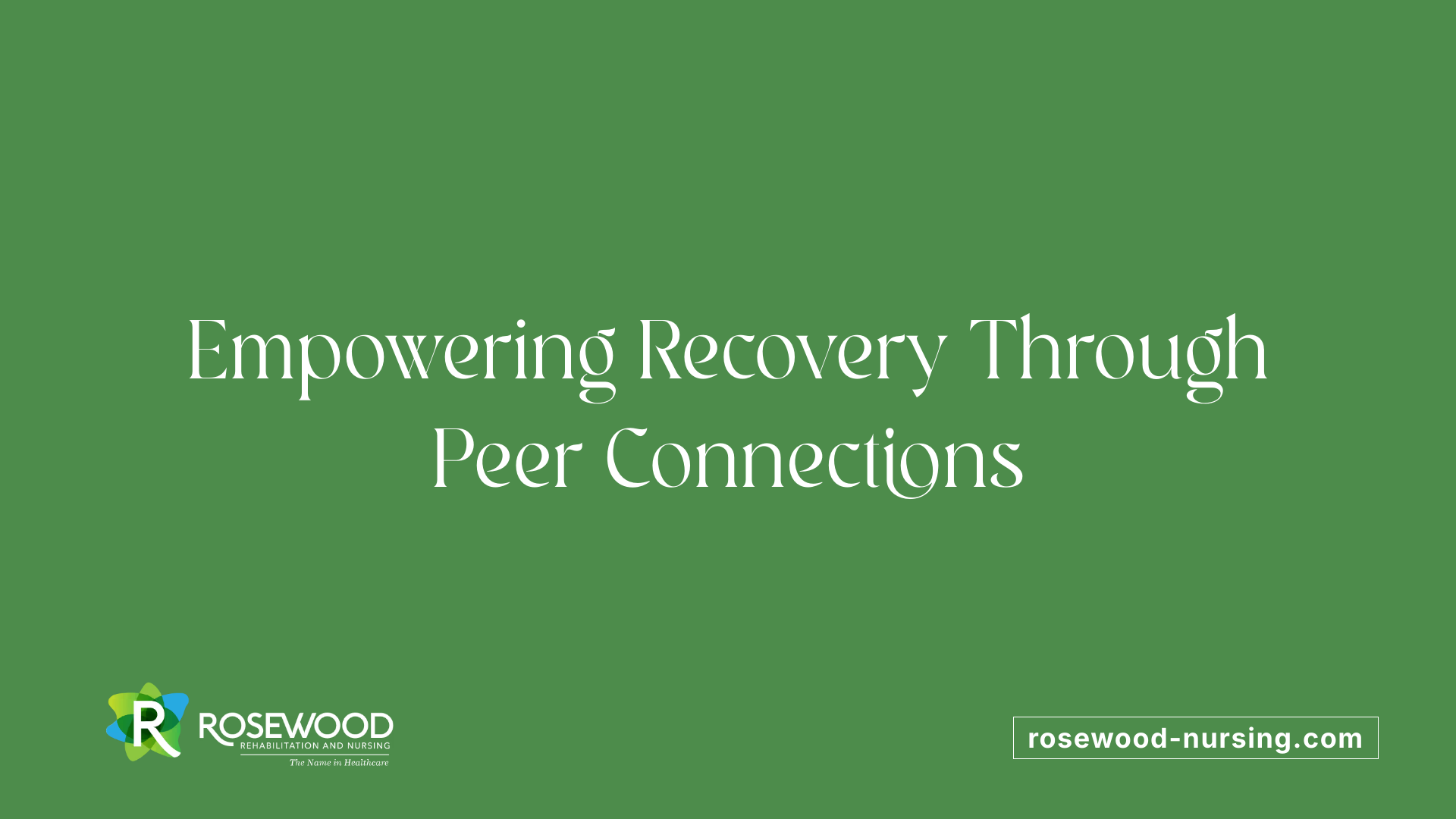
How does peer support contribute to addiction recovery?
Peer support plays a vital role in the journey to sobriety. It involves connecting individuals with others who have faced similar struggles and often have successfully navigated recovery themselves.
These shared experiences foster empathy and understanding, creating a safe space where individuals feel accepted and validated. Such support helps reduce feelings of isolation, which are common among those battling addiction.
Peer support can offer practical advice, emotional encouragement, and motivation, which are essential during challenging moments in recovery. The bonds formed through these relationships often lead to lasting connections that strengthen long-term sobriety.
Shared understanding and motivation
The power of shared understanding in peer groups provides hope and inspiration. Seeing others succeed in their recovery journey can motivate individuals to stay committed and resilient.
Peer groups like Alcoholics Anonymous (AA), Narcotics Anonymous (NA), and various online communities create environments where people can openly share their story, discuss challenges, and celebrate successes.
Being part of a community that truly understands your experience fosters a sense of belonging. This connection not only helps maintain motivation but also builds confidence and self-efficacy in managing recovery.
Building trust and motivation
Trust is fundamental in peer support relationships. It encourages openness and honesty, which are crucial for emotional healing.
Mentors and peers serve as role models, exemplifying the possibility of a sober life and reinforcing that recovery is achievable.
Active participation in peer-led activities, such as leading meetings, volunteering, or sharing stories, boosts motivation and accountability. These engagements empower individuals, helping them to take ownership of their recovery process.
Overall, peer support creates an encouraging environment that nurtures resilience, promotes sustained sobriety, and fosters a supportive community vital for overcoming addiction.
Support Networks and Their Role in Sustaining Sobriety
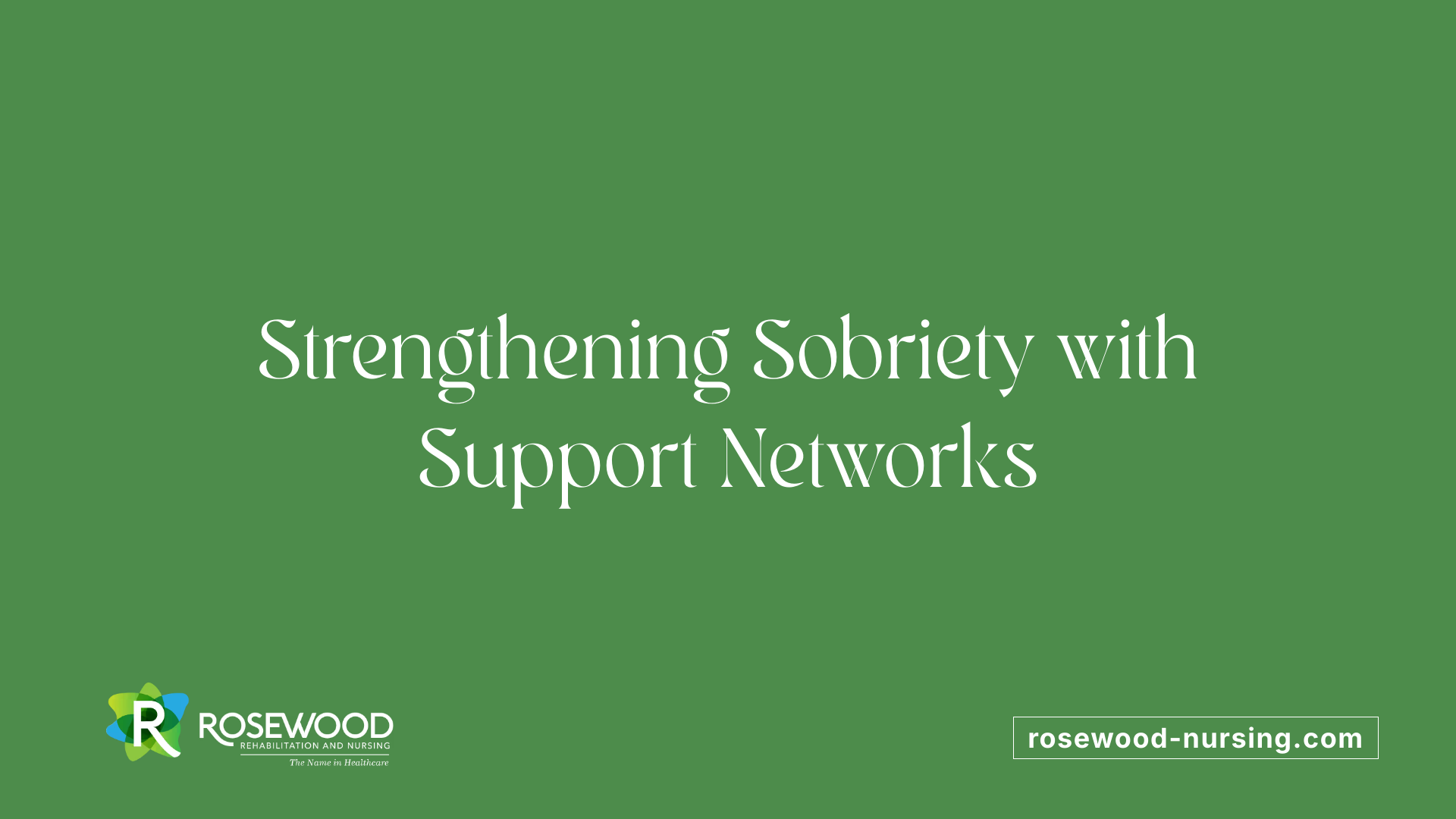
What role does support networking play in recovery from substance use and mental health challenges?
Support networks are vital components of addiction recovery because they provide emotional validation, practical resources, and social connection. These networks help individuals manage triggers and stressors that could lead to relapse. By fostering a sense of belonging and acceptance, they significantly boost self-esteem and motivation.
Participation in support groups like Alcoholics Anonymous or Narcotics Anonymous connects individuals with peers who understand their struggles firsthand. Community environments such as Oxford Houses or recovery centers create safe spaces for sharing experiences, obtaining encouragement, and learning coping strategies.
Support networks extend beyond meetings; they involve family therapy, peer mentoring, and involvement in community activities. These relationships foster resilience by providing ongoing accountability and emotional strength. They help individuals develop practical skills for managing everyday challenges and reinforce commitment to sobriety.
How does social support contribute to reducing relapse risk?
Social support plays a crucial role in diminishing the likelihood of relapse. Research shows that higher engagement in community and peer support systems correlates with increased abstinence rates.
Support groups facilitate a non-judgmental environment where individuals can share setbacks without shame, which encourages perseverance. The bonds formed in these groups often lead to lasting friendships and a broader social network—both protective factors against relapse.
Moreover, community programs like recovery cafes, coaching, and sober living help individuals develop routines and healthy habits that are resistant to relapse triggers. Support networks also offer education about cravings and relapse signs, empowering individuals to seek help early.
How can social support foster resilience and empowerment?
Building a robust social support system cultivates resilience by providing a safety net during difficult times. It encourages individuals to adopt positive coping mechanisms and to view setbacks as part of the recovery process, not failures.
Empowerment grows from feeling connected, understood, and supported in recovery efforts. Peer-led groups, mentorship programs, and active engagement in community activities allow individuals to develop leadership skills and self-efficacy.
Furthermore, participation in community support initiatives not only aids in personal growth but also inspires others, creating a cycle of mutual encouragement. The sense of shared purpose and collective healing ultimately strengthens individual resolve, making long-term sobriety more achievable.
| Aspect | Impact | Additional Details |
|---|---|---|
| Emotional Support | Reduces feelings of isolation and shame | Key in emotional healing and trust building |
| Practical Resources | Access to treatment, housing, and counseling | Supports stability and ongoing recovery |
| Community Engagement | Fosters belonging and shared purpose | Essential for resilience and empowerment |
| Support Types | 12-step groups, sober living, online forums | Provide different levels of connection and assistance |
| Outcomes | Increased abstinence, lower relapse | Supported by ongoing participation and community involvement |
Community Support in Mental Health Recovery
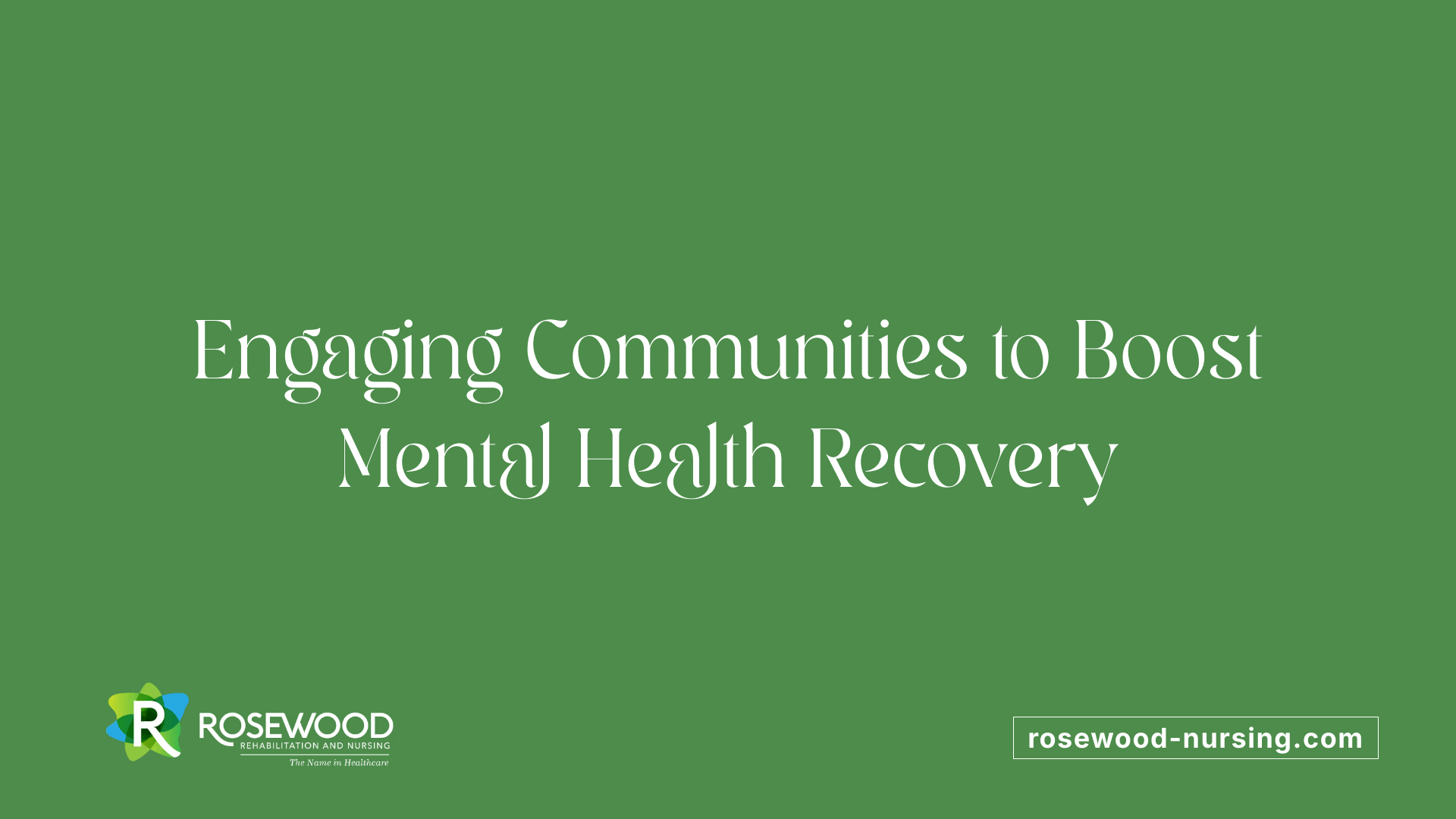
Why is community support important in mental health recovery?
Community support plays a vital role in mental health recovery by fostering a sense of connection and belonging. Engaging with others who have similar experiences helps reduce feelings of isolation and loneliness, which can often hinder progress.
Sharing experiences within a supportive community creates a safe space for emotional expression and understanding. This environment not only provides comfort but also encourages individuals to stay committed to their recovery journey.
Beyond emotional support, community networks offer practical resources such as access to counseling, peer-led groups, and educational programs. These resources collectively promote better mental health, resilience, and overall well-being.
Connecting with others helps individuals develop healthier coping strategies, gain motivation from shared successes, and find purpose in helping others. Such interactions can significantly boost confidence and mental strength, making sustained recovery more achievable.
Community support, whether through local groups, online forums, or recovery centers, enhances recovery outcomes by building a strong foundation of emotional resilience, accountability, and hope.
The Impact of Community Support Programs: Evidence and Outcomes
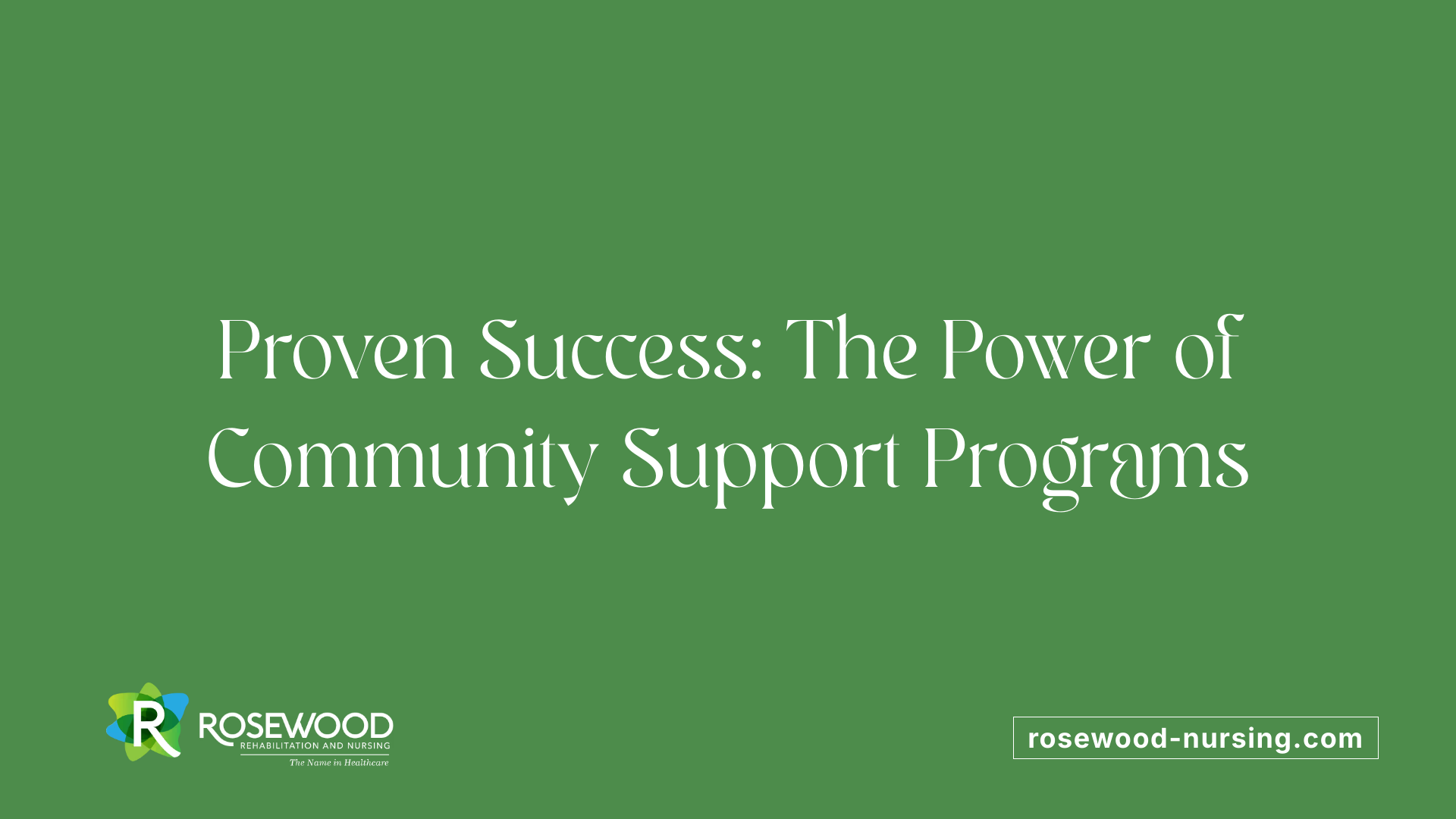
What are the statistical success rates of recovery programs?
Research indicates that between 85% and 95% of individuals who complete addiction treatment remain sober after nine months. Moreover, participation in support groups such as AA, NA, and other community programs significantly boosts long-term sobriety, with participation increasing the likelihood of staying abstinent after one year by about 50%. These figures highlight how critical community involvement is for sustained recovery.
What does research say about social support and recovery?
Social support is strongly linked to positive recovery outcomes. Greater social connections help reduce feelings of loneliness and shame, fostering a sense of belonging that promotes emotional resilience. Studies show that individuals with robust support networks tend to have higher abstinence rates, better treatment retention, and improved self-efficacy in maintaining sobriety.
How effective are community-based programs?
Community programs like recovery centers, Oxford Houses, and sober living environments create supportive atmospheres that foster community, accountability, and shared purpose. These environments have proven effective in reducing relapse rates, especially through structured peer support and social engagement. Programs such as Recovery Community Centers also offer educational workshops, therapeutic activities, and social events that help individuals rebuild social skills and confidence.
| Program Type | Main Benefit | Supporting Evidence |
|---|---|---|
| Mutual Help Organizations (e.g., AA) | Ongoing emotional support and community bonding | Increased sobriety rates and treatment adherence |
| Recovery Homes (e.g., Oxford House) | Safe, structured living environments | Increased long-term abstinence, lower relapse |
| Recovery Centers | Holistic support addressing mental health | Enhanced stability and social integration |
| Online Support Groups | Accessibility and anonymity | Maintains engagement outside traditional settings |
Engagement in these programs provides accountability, emotional reinforcement, and social resources, which are essential for overcoming challenges in recovery. This evidence underscores the importance of community and peer support systems in fostering lasting sobriety.
Types of Community-Based Recovery Support Services
Support groups (AA, NA, SMART Recovery)
Support groups such as Alcoholics Anonymous (AA), Narcotics Anonymous (NA), and SMART Recovery are foundational components of community-based recovery. These groups offer a safe, non-judgmental environment where individuals can share experiences, gain emotional support, and learn coping strategies. Attending regular meetings enhances accountability, builds relationships, and fosters hope, significantly increasing the chances of maintaining sobriety long-term.
Recovery homes (Oxford Houses)
Recovery homes like Oxford Houses provide structured, self-run sober living environments. Since the 1970s, Oxford Houses have demonstrated success in promoting ongoing sobriety by fostering a supportive community among residents. These homes emphasize shared responsibility, mutual support, and consistent rules that help residents reintegrate into society while maintaining abstinence. Social networks formed within these houses are vital in protecting against relapse.
Community centers and recovery cafes
Community centers and recovery cafes serve as social hubs that provide broader support services, including support groups, educational workshops, and recreational activities. These establishments create welcoming environments where individuals can connect, learn new skills, and receive practical assistance. Programs like art therapy, wellness activities, and peer mentoring offered at these centers promote emotional healing, social reintegration, and sustained recovery.
Peer mentorship and recovery coaches
Peer mentors and recovery coaches are individuals who have successfully navigated their own recovery journeys. Their firsthand experience enables them to offer personalized emotional support, guidance, and motivation. They assist in developing recovery plans, overcoming barriers, and connecting individuals with community resources. This peer-led support fosters trust, hope, and resilience, fostering long-term sobriety.
Online support platforms
Digital platforms, including online forums and virtual support groups, expand access to recovery resources, especially for those in remote or underserved areas. Online communities provide continuous emotional support, educational content, and peer connections, making recovery support more flexible and accessible. These virtual spaces help reduce isolation and promote ongoing engagement, complementing in-person support efforts.
| Support Type | Key Benefits | Additional Details |
|---|---|---|
| Support Groups | Emotional support, accountability, shared experience | Examples: AA, NA, SMART Recovery |
| Recovery Homes | Sustained sobriety, social network, reintegration | Example: Oxford Houses |
| Community Centers & Cafes | Education, social activities, holistic support | Various programs and therapies |
| Peer Mentorship & Coaches | Personalized support, motivation, real-world advice | Trained individuals with lived experience |
| Online Platforms | Accessibility, ongoing connection, anonymity | Forums, virtual meetings |
Structured Support Systems for Long-Term Recovery
Recovery Residences and Sober Living Environments
Recovery homes, such as Oxford Houses, are structured environments that promote sobriety through peer support and accountability. These self-run, community-oriented residences offer a safe space for individuals to live together while maintaining abstinence. Social networks within these settings serve as strong protective factors against relapse, reinforcing the importance of community in recovery.
Rehabilitation Centers and Aftercare Programs
Rehabilitation centers like Psyclarity Health provide comprehensive treatment, including detoxification, counseling, and mental health support. These programs often extend into aftercare, such as ongoing counseling, peer support groups, and alumni programs like 7 Summit Pathways. Such continuous support helps sustain sobriety by addressing both addiction and related mental health issues.
Long-Term Engagement Strategies
Maintaining sobriety involves active participation in support activities like peer-led groups, community centers, and volunteer opportunities. Building relationships with peer support workers and recovery coaches fosters ongoing motivation and accountability. Strategies such as regular attendance at support meetings, involvement in recovery community events, and engaging in sober living activities are vital for long-term success. These approaches create a robust network, reducing isolation and promoting resilience.
| Support System Type | Description | Contribution to Recovery |
|---|---|---|
| Recovery residences | Oxford Houses, sober living homes | Offer peer support and a drug-free environment |
| Rehab and aftercare | Professional treatment, counseling, alumni programs | Provide ongoing professional and peer support to sustain recovery |
| Support groups | AA, NA, SMART Recovery | Foster community, accountability, and shared experience |
| Community centers | Education, wellness, social activities | Support emotional healing and social reintegration |
Building and engaging with these structured support systems significantly enhances the likelihood of long-term sobriety by creating a continuous network of emotional, social, and practical support.
Building a Supportive Community Environment
How can community outreach and education strengthen recovery?
Community outreach and educational programs are fundamental in increasing awareness about addiction and reducing stigma. These initiatives inform the public, promote understanding, and encourage compassionate support for individuals in recovery. Events, campaigns, and workshops can help dispel myths and show that addiction is a treatable condition, motivating more people to seek help.
What role does family involvement and therapy play?
Family involvement is crucial in the recovery process. Family therapy helps improve communication, address misunderstandings, and rebuild trust, providing emotional support vital for sustained sobriety. When families are engaged, they can better support their loved ones’ recovery journey, reinforce positive behaviors, and create a stable environment.
How important is collaboration between healthcare providers and community organizations?
Partnerships between healthcare providers and community organizations create a comprehensive support network. These collaborations enable coordinated care, combining medical treatment, mental health services, and social support. Such integration enhances treatment effectiveness, ensures continuity of care, and helps address multifaceted issues related to addiction.
How does volunteerism and peer mentorship enhance recovery?
Volunteer programs and peer mentorship are powerful tools for ongoing support. Mentors, who are often individuals with lived recovery experience, provide relatable guidance, encouragement, and hope. Volunteering offers individuals in recovery a sense of purpose and belonging, fostering resilience and reinforcing their commitment to sobriety.
| Initiative Type | Main Focus | Impact on Recovery |
|---|---|---|
| Community outreach | Education & awareness | Reduces stigma, motivates treatment-seeking |
| Family therapy | Emotional support & communication | Strengthens family bonds, improves support system |
| Healthcare-community collab | Integrated treatment & resources | Seamless services, comprehensive care |
| Volunteer & peer mentorship | Ongoing encouragement | Builds support networks, promotes resilience |
Active engagement in all these areas fosters resilience, accountability, and long-lasting recovery, highlighting that community plays an essential role beyond clinical treatment.
Fostering Resilience and Hope through Community
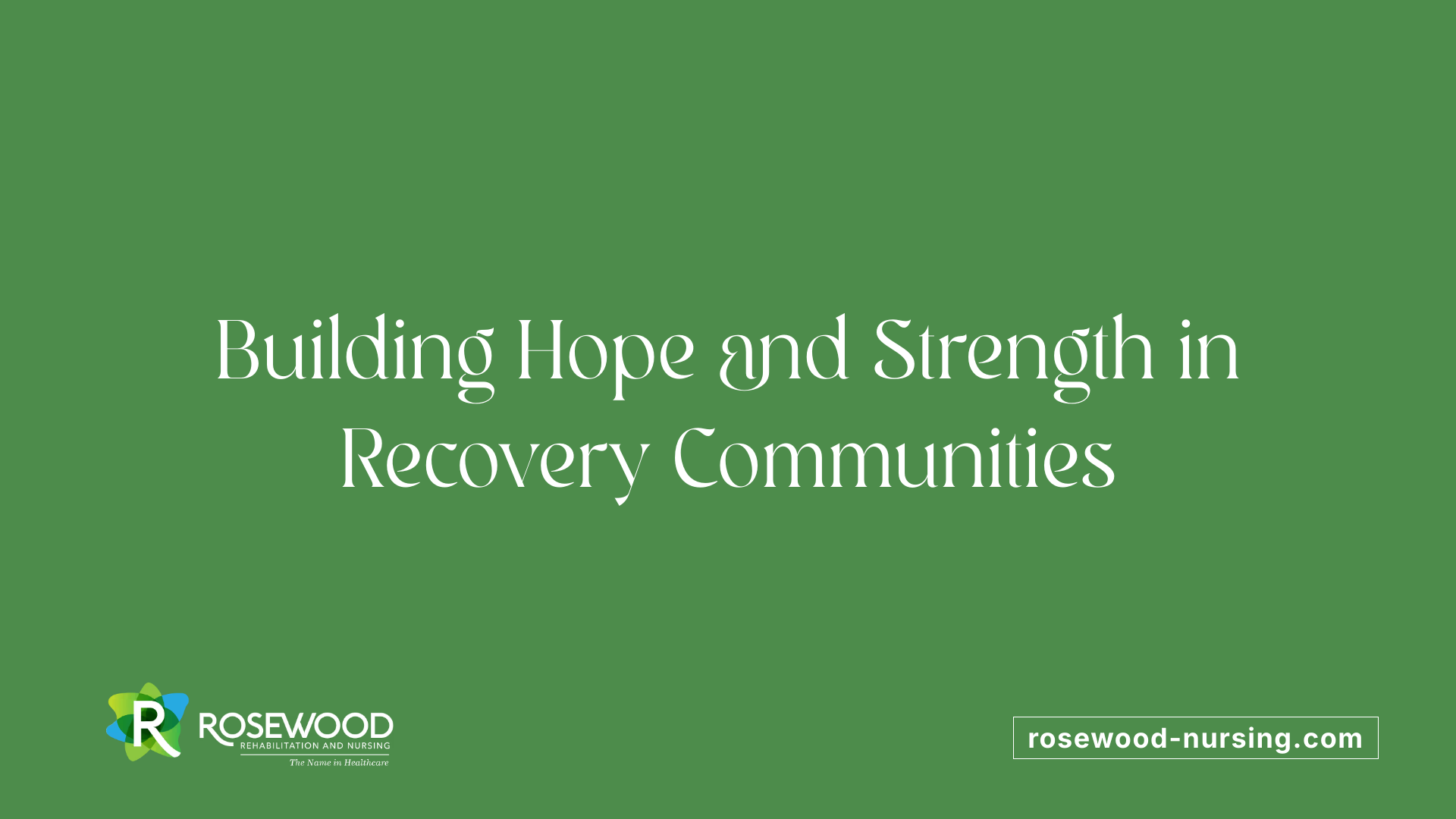
Sharing success stories
One powerful way communities cultivate hope is by sharing success stories of individuals who have overcome addiction. These stories serve as inspiring examples, demonstrating that long-term recovery is achievable. Hearing about others' journeys provides motivation and reinforces the possibility of lasting change, helping to build resilience among newcomers.
Creating a culture of acceptance
A supportive community promotes an environment of acceptance and understanding. This reduces stigma associated with addiction, encouraging more people to seek help without fear of judgment. When community members actively embrace recovery stories and support peers, it fosters trust and inclusiveness, making recovery feel more attainable.
Encouraging community participation in recovery initiatives
Active participation in recovery programs and initiatives strengthens social bonds. Volunteering, participating in support groups, and engaging in community events help individuals build a robust network of support. These activities promote accountability, shared purpose, and collective resilience.
Long-term benefits for individuals and communities
Sustained community support contributes to better recovery outcomes, including lower relapse rates and improved mental health. For communities, fostering resilience reduces social and economic costs associated with addiction, while creating healthier, more connected environments. Over time, these efforts cultivate a culture of hope, collective strength, and ongoing recovery.
| Aspect | Impact | Additional Details |
|---|---|---|
| Success stories | Inspire and motivate | Show real-life possibilities of recovery |
| Acceptance | Reduce stigma | Encourage seeking help and community involvement |
| Participation | Strengthen networks | Build accountability and shared responsibility |
| Long-term benefits | Foster resilience | Promote healthier individuals and communities |
The Collective Power of Community in Recovery
Community support programs are integral to successful recovery from substance use disorder, providing emotional sustenance, practical resources, and a sense of belonging. Through peer mentorship, mutual help organizations, and community-based services, individuals are empowered to overcome challenges, build resilient social networks, and sustain long-term sobriety. The collective effort of healthcare providers, community organizations, families, and peers creates an environment where recovery is not just possible but thriving.
References
- The Importance of Social Support in Recovery Populations
- The Role of Community and Support Systems in Addiction ...
- The Role of Community in Supporting Recovery
- The Role of Community Centers in Supporting Addiction ...
- The Importance of Community and Peer Support in Recovery
- Benefits of peer support groups in the treatment of addiction
- The Role of Community in Your Recovery
- Substance Use Disorder Recovery- The Role of Support ...
- The Role of Community Support in Sustainable Addiction ...
Similar articles

Exercise Videos For Seniors



The Role of Therapy Services in Preventing Falls in Elderly Residents

The Benefits of Pet Therapy in Long-Term Care Facilities

How to Encourage Participation in Therapy for Long-Term Care Residents
Contact us today and experience ”The Name in Healthcare”
Where compassion, well-being, and a welcoming community converge to redefine your healthcare journey. Welcome to Rosewood, where your family becomes our family.














